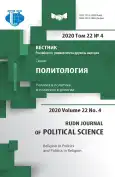The Transformation of Radical Islam in a Post-Industrial Society
- Authors: Demidenko S.V.1, Kutuzova A.A.1
-
Affiliations:
- The Russian Presidential Academy of National Economy and Public Administration
- Issue: Vol 22, No 4 (2020): RELIGION IN POLITICS AND POLITICS IN RELIGION
- Pages: 690-712
- Section: CHALLENGES OF THE ISLAMIC WORLD
- URL: https://journal-vniispk.ru/2313-1438/article/view/322191
- DOI: https://doi.org/10.22363/2313-1438-2020-22-4-690-712
- ID: 322191
Cite item
Full Text
Abstract
In a post-industrial society, radical Islam has undergone significant evolutionary changes, that contributed to its transformation from a religious ideology to a political one. The key element of the updated doctrine was the idea of creating a world Islamic state - caliphate - through global jihad. This article explores a new stage in the history of the phenomenon of Islamic radicalism, which has developed outside the Muslim world, where it has acquired features of a specific subculture. Global jihad is gaining popularity among young Muslims in Europe, the US, and Southeast Asia. A variety of cultural manifestations of Islamism, united by the term «jihadi-cool», form an attractive image of a Salafist-jihadists through a special manner of clothing, new types of music (jihad rap and jihad rock), etc. Members of this subculture tend to join terrorist organizations, spread radical ideas among young people and attract new supporters. One of the most important causes of the radicalization of Muslims in Europe and the Americas is considered to be the complex socio-economic and cultural preconditions created by Western policies towards the States of the Middle East and the local Muslim diaspora. As part of the research, a historical-genetic analysis of the evolutionary transformations of Islamic radicalism has been conducted. The statistical method has been used to track the number of terrorist acts in the EU and the USA. Content analysis has been applied in the article in order to examine lyrics of jihad-rap musical compositions. The interdependence of jihad-rap popularity and the general interest in the ideology of jihad has been assessed based on the analysis of statistics of search queries. Biographical methods have been used to study the relationship between belonging to a jihadist subculture and joining radical Islamic organizations. The results of the study demonstrate, first of all, the high adaptability of Islamic radicalism to the changing conditions of the global world. Secondly, they indicate the specific evolution of a phenomenon that gradually overcomes sectarian differences. And third, they note increasing prevalence of this destructive doctrine in Europe, USA, South and Southeast Asia. All the results confirm that Islamic radicalism is not a local phenomenon, but a real threat to global political stability.
About the authors
Sergey V. Demidenko
The Russian Presidential Academy of National Economy and Public Administration
Author for correspondence.
Email: demidenko-sv@ranepa.ru
PhD Historical in Science, Dean of the School of Political Research, Institute of Social Sciences
82, Vernadskogo prospect, Moscow, 119571, Russian FederationAnastasia A. Kutuzova
The Russian Presidential Academy of National Economy and Public Administration
Email: kutuzova-aa@ranepa.ru
Master Student of the Department of Political Science and Political Management
82, Vernadskogo prospect, Moscow, 119571, Russian FederationReferences
- Vasilyev A.M. History of Saudi Arabia. Moscow: Nauka; 1982. (In Russ.).
- Hoveyda F. The Broken Crescent: The “threat” of Militant Islamic Fundamentalism. Greenwood Publishing Group; 1998.
- Matson O.O. The formation of relations between the Muslim diaspora and the titular ethnic group of Germany in the 20th and 21st centuries. The Bryansk State University Herald. 2016; 2 (28): 75–77. (In Russ.).
- Kettani H. Muslim Population in Europe: 1950–2020. International Journal of Environmental Science and Development. 2010; 1 (2): 154–164.
- Voas D., Fleischmann F. Islam Moves West: Religious Change in the First and Second Generations (August 2012). Annual Review of Sociology. 2012; 38: 525–545.
- Roy O. Globalized Islam: The Search for a New Ummah. New York: Columbia University Press; 2004.
- Warrick J. Black Flags: The Rise of ISIS. Anchor; 2016.
- Smith A. The Politics of Economic Activity. Oxford: Oxford University Press; 2016.
- Ilan J., Sandberg S. How ‘gangsters’ become jihadists: Bourdieu, criminology and the crime–terrorism nexus. European Journal of Criminology. 2019; 16 (3): 278–294.
- Lemieux A. F., Brachman J. M., Levitt J., Wood J. Inspire magazine: A critical analysis of its significance and potential impact through the lens of the information, motivation, and behavioral skills model. Terrorism and Political Violence. 2014; 26: 1–18.
- Muzakki A. The roots, strategies, and popular perception of Islamic radicalism in Indonesia. Journal of Indonesian Islam. 2014; 8 (1): 1–22.
- Nacos B. Mass-Mediated Terrorism. Mainstream and Digital Media in Terrorism and Counterterrorism, Third Edition. Rowman & Littlefield Publishers; 2016.
- Drąg W., Krogulec J., Marecki M. War and Words. Representations of Military Conflict in Literature and the Media. Cambridge Scholars Publishing; 2016.
- Nilan P. Muslim Youth in the Diaspora. Challenging Extremism through Popular Culture. Routledge; 2019.
- Morris T. Dark ideas: how neo-Nazi and violent jihadi ideologues shaped modern terrorism. Lexington Books; 2017.
- Schmid A.P. The Routledge Handbook of Terrorism Research. N.Y.: Taylor & Francis; 2011.
- Price E. Terrorists, Extremists, Militants: Selected Biographies, Autobiographies and related Documents and Writings. Perspectives on Terrorism. 2014; 8 (3): 126–134.
Supplementary files









